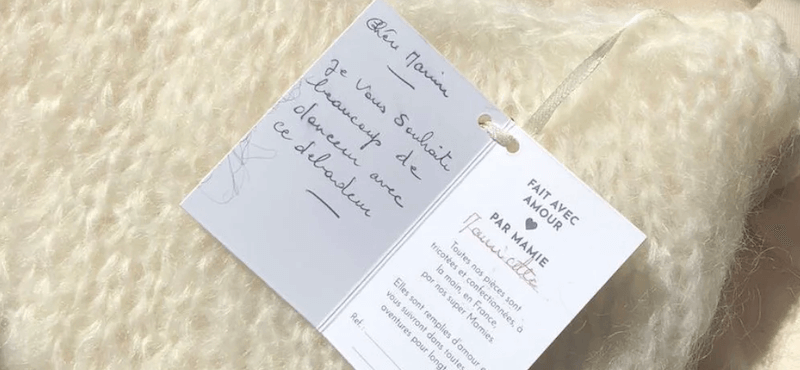Offering more than just knitwear, Les Mains de Mamie is on a mission to connect generations — the Marseille-based startup's sweaters are all handmade by French grandmothers.
Each piece is knit on demand, which can take up to 28 days. When a customer places an order, the company offers the gig to one of its ‘gang of grannies.’ Once they’ve accepted, the grannies are sent materials and knit a sample to check technique and tension before getting to work. When they're done, they sign their piece and send it off to Les Mains de Mamie.
Over 30 mamies across France work as self-employed professionals for the brand, allowing them to supplement their retirement income. The average knitter completes three to four sweaters a month and is paid EUR 20–50 per garment, depending on its complexity.
Les Mains de Mamie was founded by Aurélie De Barros and her brother John shortly before the pandemic hit. In January 2023, the brand raised EUR 150,000 on the French version of Shark Tank and made its national retail debut at Galeries Lafayette Paris Haussmann, where it's part of a program dedicated to preowned and responsible fashion.

Trend Bite
The antithesis of mass-produced fast fashion, Les Mains de Mamie interlocks multiple trends. Its ethical approach will appeal to consumers seeking brands that align with their values, while its knitting grandmas represent the enterprization of consumers. But foremost, the knitwear label is a social enterprise.
Inspired by the founders' own seamstress grandmother, the startup was created to connect generations and forge meaningful bonds between the gang of grannies and their often younger customers. In addition to facilitating contact amongst the grandmas — united through their love of knitting — Les Mains de Mamie also organizes workshops where customers and knitters can interact with and learn from each other.
For brands that have lost that connection between makers and buyers: are there ways you could transform anonymous production into a supportive community? Could you cultivate online or offline spaces where customers and makers meet and share ideas?
Join 100,000+ future-focused professionals in 180 countries already receiving our free trend updates.
Select your country